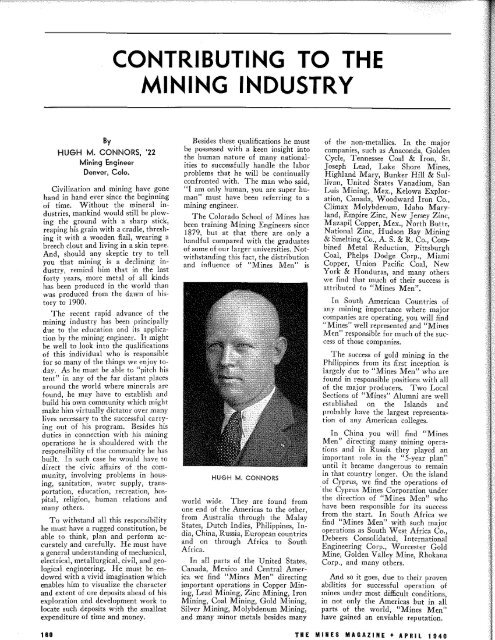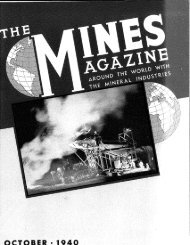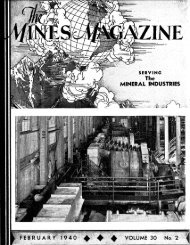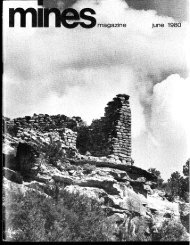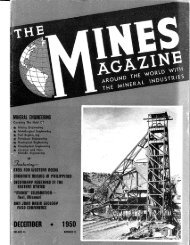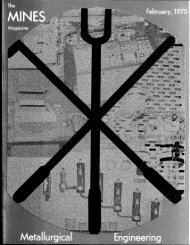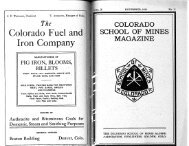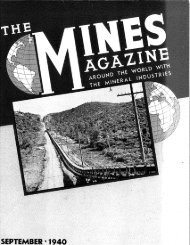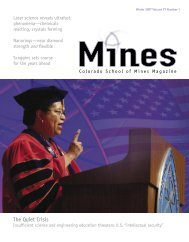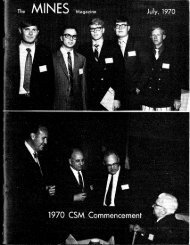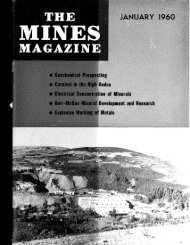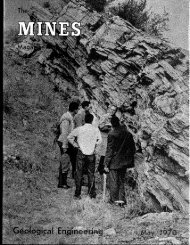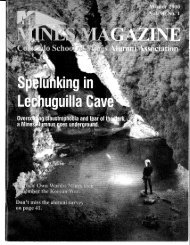A L U M N I N U M B C E L E B R A T I N G ... - Mines Magazine
A L U M N I N U M B C E L E B R A T I N G ... - Mines Magazine
A L U M N I N U M B C E L E B R A T I N G ... - Mines Magazine
You also want an ePaper? Increase the reach of your titles
YUMPU automatically turns print PDFs into web optimized ePapers that Google loves.
C O N T R I B U T I N G T O T H EM I N I N G I N D U S T R YIMPORTANCE OF THE GEOLOGICALAND GEOPHYSICAL ENGINEERByHUGH M. CONNORS. '22Mining EngineerDenver, Colo.Civilization and mining have gonehand in hand ever since the beginningof time. Without the mineral industries,manlcind would still be plowingthe ground with a sharp stick,reaping his grain with a cradle, threshingit with a wooden flail, wearing abreech clout and living in a skin tepee.And, should any skeptic try to tellyou that mining is a declining industry,remind him that in tbe lastforty years, more metal of all kindshas been produced in tbe world thanwas produced from the dawn of historyto 1900.Xhe recent rapid advance of themining industry has been principallydue to the education and its applicationby the mining engineer. It mightbe well to look into the qualificationsof this individual who is responsiblefor so many of the things we enjoy today.As he must be able to "pitch histent" in any of the far distant placesaround the world where minerals arefound, he may have to establish andbuild his own community which mightmake him virtually dictator over manylives necessary to the successful carryingout of his program. Besides hisduties in connection with his miningoperations he is shouldered with theresponsibility of tbe community he hasbuilt. In such case he would have todirect tbe civic affairs of the community,involving problems in housing,sanitation, water supply, transportation,education, recreation, hospital,religion, human relations andmany others.To withstand all this responsibilityhe must have a rugged constitution, beable to think, plan and perform accuratelyand carefully. He must havea general understanding of mechanical,electrical, metallurgical, civil, and geologicalengineering. He must be endowedwith a vivid imagination whichenables him to visualize the characterand extent of ore deposits ahead of hisexploration and development work tolocate such deposits with the smallestexpenditure of time and money.Besides these qualifications he mustbe possessed with a keen insight intothe human nature of many nationalitiesto successfully handle the laborproblems that he will be continuallyconfronted with. The man who said,"I am only human, j'ou are super human"must have been referring to amining engineer.The Colorado School of <strong>Mines</strong> hasbeen training Mining Engineers since1879, but at that there are only ahandful compared with the graduatesof some of our larger universities. Notwithstandingthis fact, the distributionand influence of "<strong>Mines</strong> Men" isHUGH M. CONNORSworld wide. They are found fromone end of the Americas to the other,from Australia through the MalayStates, Dutch Indies, Philippines, India,China, Russia, European countriesand on through Africa to SouthAfrica.In all parts of the United States,Canada, Mexico and Central Americawe find "<strong>Mines</strong> Men" directingimportant operations in Copper Mining,Lead Mining, Zinc Mining, IronMining, Coal Mining, Gold Mining,Silver Mining, Molybdenum Mining,and many minor metals besides manyof the non-metallics. In the majorcompanies, such as Anaconda, GoldenCycle, Tennessee Coal & Iron, St.Joseph Lead, Lake Shore <strong>Mines</strong>,Highland Mary, Bunker Hill & Sullivan,United States Vanadium, SanLuis Mining, Mex., Kelowa Exploration,Canada, Woodward Iron Co.,Climax Molybdenum, Idaho Maryland,Empire Zinc, New Jersey Zinc,Mazapil Copper, Mex., North Butte,National Zinc, Hudson Bay Mining& Smelting Co., A. S. & R. Co., CombinedMetal Reduction, PittsburghCoal, Phelps Dodge Corp., MiamiCopper, Union Pacific Coal, NewYork & Honduras, and many otherswe find that much of their success isattributed to "<strong>Mines</strong> Men".In South American Countries ofany mining importance where majorcompanies are operating, you will find"<strong>Mines</strong>" well represented and "<strong>Mines</strong>Men" responsible for much of the successof those companies.The success of gold mining in thePhilippines from its first inception islargely due to "<strong>Mines</strong> Men" who arefound in responsible positions with allof the major producers. Two LocalSections of "<strong>Mines</strong>" Alumni are wellestablished on the Islands andprohably have the largest representationof any American colleges.In China you will find "<strong>Mines</strong>Men" directing many mining operationsand in Russia they played animportant role in the "5-year plan"until it became dangerous to remainin that country longer. On the islandof Cyprus, we find the operations ofthe Cyprus <strong>Mines</strong> Corporation underthe direction of "<strong>Mines</strong> Men" whohave been responsible for its successfrom the start. In South Africa wefind "<strong>Mines</strong> Men" with such majoroperations as South West Africa Co.,Debeers Consolidated, InternationalEngineering Corp., Worcester GoldMine, Golden Valley Mine, RhokanaCorp., and many others.And so it goes, due to their provenabilities for successful operation ofmines under most difficult conditions,in not only tbe Americas but in allparts of the world, "<strong>Mines</strong> Men"have gained an enviable reputation.ByW. A. WALDSCHMIDTAssociate Professor of GeologyColorado School of <strong>Mines</strong>Exploration and discovery of theworld's vast and hidden mineral resourcesare no longer undertakingsfor amateurs, but tasks for mentrained in the fundamentals ofgeology and geophj'sics.Previously to the last generation,discoveries of mineral deposits—metallic, non-metallic, and fuel—were made in great part by men withlittle scientific training. Yet, thesemen, endowed with perseveranceand a lust for adventure, combinedtheir smattering of knowledge withcommon sense or instinct, and foundby digging, or by sheer luck, many ofthe world's great mineral deposits.The compilation of facts relativeto mineral deposits thus discoveredformed a basis upon which otherscould guide their exploration activitiesmore efficiently. Year after year,this accumulation of facts, publishedand unpublished, led to the propoundingof theories about the origin andaccumulation of oil and gas, theoriesof the origin of mineral deposits,theories of coal formation, andtheories of earth structure. Thesetheories, as well as numerous relatedfacts and postulations, are today embodiedin the broad subject of geology—a subject vital to the mineral industries.But geology has become sucha complex subject that it must nowbe divided and subdivided intonumerous branches such as mineralogy,petroleum geology, mininggeology, paleontology, micropaleontology,petrography, optical mineralogy,mineralography, and others.Thus, while the student of a generationago covered the subject of geologyas a whole, the student of today mustnot only study the broad phases, butmust choose a branch in which tospecialize.The application to exploration activitiesof geological knowledgegained by study is also becoming morecomplex. During the early days ofpetroleum production no systematicmethod of exploration was in practice,but after tbe establishment of proofthat oil and gas accumulated inanticlinal structures, discovery of oilfields grew by leaps and bounds. Inmany regions anticlinal structureswere easily recognized, mapped, andsubsequently drilled. Some of thesestructures were located by geologists,but others were located by men untrainedin geology.Since tbe most apparent structureshave been located and drilled, thetask of locating additional anticlinalstructures and other types of traps isbecoming more and more difficultletus say, the easy geological mappinghas been completed, and the difficultmapping now confronts us. SurfaceW. A. WALDSCHMIDTsurvej'ing now has to be supplementedby core drilling; microscopic studiesof cores and cuttings, including theidentification of micro-fossils; geophysicalsurveying; and hy studies ofregional geology and paleogeography.Similarly, the application of geologyand geophysics to the exploration forore minerals is becoming more intricate.The early-day prospector followedthe crowd and depended onluck, the experience of others, and onhis "Grub Stake". The present-dayprospector, who should be a geologist,must rely on surface mapping; studiesof trends; application of theories ofore deposition; geophysical surveys,and core drilling—but he too musthave a "Grub Stake".In the development of a new or anold mine much detailed geologicalwork must also be undertaken. Petrographicexaminations of the ganguerocks and examinations of polishedsections of the ores must be made inorder to determine the mineral relationshipsand grain sizes which mayhave a direct bearing upon the millingof the ore. Such work must, orshould be done previous to milling,and should be carried on during theprocess of milling in order to maintainbetter control.Naturally, the work of the geologistin mining may overlap the workof the mining engineer, or the metallurgist.In many cases the work ofthe geologist may he done by the miningengineer, or the work of the miningengineer by the geologist. Likewise,some of the work of the metallurgistmay require a knowledge ofsome phase of geology. Because ofthe overlaps of mining, metallurgical,geological, and petroleum engineering,it is necessary for a young manto receive basic training in all ofthese subjects, but to specialize in one.Such training is given to MINESmen. A geological engineer is trainedin the fundamentals of geology, andis allowed to devote extra time tospecializing in some phase of this subject.In addition, he is trained inthe fundamentals of other engineeringsubjects. Thus, he leaves theschool not only with a basic trainingin his selected profession, but alsowith a broad training that permitshim to branch into other phases oftbe mineral industries aside from exploration.Some may say that MINES menwho receive the degree of GeologicalEngineer, which also embodies trainingin geophysics, are, when theygraduate, merely amateurs in theirfield of endeavor. But, it should beremembered that they are trainedamateurs, well grounded in the fundamentalprinciples of engineering, andthat with this equipment and additionalexperience they will soon reachthe rank of professionals. This contentionis supported by the number ofMINES graduates who are holdingresponsible positions in the geologicaland geophysical professions throughoutthe United States and foreigncountries. Many of these men havegraduated only recently, but with thetraining received at MINES theyhave been able to achieve success intheir chosen field in a comparativelyshort period of time.ISO THE MINES MAGAZINE -f APRIL 1940THE MINES MAGAZINE APRIL 1 940181


